National Institutes of Health (NIH)
See the following -
An Argument for Standardized Reference Terminologies
 As a National Institutes of Health (NIH) article explains, standardized data is ‘crucial for data exchange between health information systems, epidemiological analysis, quality and research, clinical decision support systems, administrative functions.” Terminology is an important part of medicine. In short, it is a clinicians’ extensive healthcare vocabulary, which they use to describe a patients’ conditions and health events. With the onset of EHRs, clinicians are responsible for documenting patient information in EHRs. This is now properly done with standardized reference terminologies and not home-grown ones.
As a National Institutes of Health (NIH) article explains, standardized data is ‘crucial for data exchange between health information systems, epidemiological analysis, quality and research, clinical decision support systems, administrative functions.” Terminology is an important part of medicine. In short, it is a clinicians’ extensive healthcare vocabulary, which they use to describe a patients’ conditions and health events. With the onset of EHRs, clinicians are responsible for documenting patient information in EHRs. This is now properly done with standardized reference terminologies and not home-grown ones.
- Login to post comments
Knowledge-Sharing Platforms Emerge From Life Science Research Collaboration
One of the hottest topics at life science conferences these days is collaboration. For budgetary reasons, pharmaceutical companies that 10 or 15 years ago would have handled every aspect of research and development in-house have externalized those services to academic partners and outsourced service providers. Read More »
- Login to post comments
$3.6 Million to Fund Personalized 3-D Brain Maps to Guide Neurosurgeries
 Neurosurgeons must avoid cutting into parts of the brain responsible for key functions such as language (orange) and vision (green), but individuals vary in where such functions are located (each of the top images compared with the bottom images above). Researchers are creating a software program that uses data from MRI scans to create personalized anatomic and functional brain maps and integrate them into a navigational system to guide physicians during neurosurgery. Removing a brain tumor requires walking a fine line: Remove too little, and the disease remains; remove too much, and sight, speech or movement may be impaired...
Neurosurgeons must avoid cutting into parts of the brain responsible for key functions such as language (orange) and vision (green), but individuals vary in where such functions are located (each of the top images compared with the bottom images above). Researchers are creating a software program that uses data from MRI scans to create personalized anatomic and functional brain maps and integrate them into a navigational system to guide physicians during neurosurgery. Removing a brain tumor requires walking a fine line: Remove too little, and the disease remains; remove too much, and sight, speech or movement may be impaired...
- Login to post comments
$85 Million Grant Supports UCSF Clinical and Translational Science Institute
 UC San Francisco’s Clinical and Translational Science Institute (CTSI) has received $85 million over five years from the National Institutes of Health (NIH) to continue to provide training, research support and other services, and to launch new programs aimed at diversifying the patients in research and advancing precision medicine. The new efforts seek to remove barriers to utilizing electronic medical records and emerging technologies, so research can be conducted more efficiently and in a broadly representative patient population, while ensuring that it is done securely and with informed consent...
UC San Francisco’s Clinical and Translational Science Institute (CTSI) has received $85 million over five years from the National Institutes of Health (NIH) to continue to provide training, research support and other services, and to launch new programs aimed at diversifying the patients in research and advancing precision medicine. The new efforts seek to remove barriers to utilizing electronic medical records and emerging technologies, so research can be conducted more efficiently and in a broadly representative patient population, while ensuring that it is done securely and with informed consent...
- Login to post comments
'Moral Bankruptcy of Capitalism': UK’s Top Public Doctor Shames Western Society Over Ebola
Western countries should tackle drugs firms’ “scandalous” reluctance to invest in research into the virus which has already killed over 700 people in West Africa, the UK’s top public doctor said, adding, “They’d find a cure if Ebola came to London.” The pharmaceutical industry are reluctant to invest in research to produce treatments and vaccines “because the numbers involved are, in their terms, so small and don't justify the investment,” said Professor John Ashton, president of the UK Faculty of Public Health, an independent body for specialists in public health in the United Kingdom. Read More »
- Login to post comments
3Rs For Innovating Novel Antibiotics: Sharing Resources, Risks, And Rewards
The stream of new antibiotics is struggling to keep up with emerging bacterial resistance. Anthony So and colleagues examine what can be done to increase innovation... Read More »
- Login to post comments
9 Healthcare Innovations Driven By Open Data
...IBM and the Cleveland Clinic announced that Watson was turning to more serious pursuits and had "enrolled" in medical school. It's been a productive partnership: Last month, they launched a new Watson program using genomic data to find the best options for cancer patients...
- Login to post comments
A Law Professor’s Big Idea for Combating Greedy Drug Company Titans Like Martin Shkreli
In 2015, CEO of Turing Pharmaceuticals Martin Shkreli infamously raised the price of the life-saving drug Daraprim by 5,000%. Daraprim, developed more than 60 years ago, is used to treat the deadly parasitic infection toxoplasmosis. It was selling for $13.50 a pill; then Turing raised the price to $750. The move sparked massive backlash and Congressional hearings, and Shkreli himself was eventually arrested for, and convicted of, unrelated securities fraud charges. But the original, horrible problem didn’t get fixed. Turing kept the price sky-high; as of August 2016, many patients were paying $375 per pill...
- Login to post comments
Academia.edu Founder On Open Access Dreams
Discoveries by laypeople are rare but free access to research results would increase the likelihood, says Richard Price
- Login to post comments
Academic Biomedical Research Community Should Take Action to Build Resilience to Disasters
 The academic biomedical research community should improve its ability to mitigate and recover from the impacts of disasters, says a new report from the National Academies of Sciences, Engineering, and Medicine. The consequences of recent disasters, from hurricanes to cyberattacks, have shown that the investments of the U.S. federal government and other research sponsors -- which total about $27 billion annually -- are not uniformly secure. The report recommends 10 steps that academic research institutions, researchers, and research sponsors should take to bolster the resilience of academic biomedical research.
The academic biomedical research community should improve its ability to mitigate and recover from the impacts of disasters, says a new report from the National Academies of Sciences, Engineering, and Medicine. The consequences of recent disasters, from hurricanes to cyberattacks, have shown that the investments of the U.S. federal government and other research sponsors -- which total about $27 billion annually -- are not uniformly secure. The report recommends 10 steps that academic research institutions, researchers, and research sponsors should take to bolster the resilience of academic biomedical research.
- Login to post comments
Academic Publishers Have Become The Enemies Of Science
The US Research Works Act would allow publishers to line their pockets by locking publicly funded research behind paywalls Read More »
- Login to post comments
AHRQ Providing Support for OpenMRS
As the AHRQ report explains it, “PIH and the Regenstrief Institute in Indianapolis conceived of OpenMRS in 2005 as a flexible, open source EMR that would be capable of meeting the demand for high-quality health information in developing countries such as Rwanda and Kenya, where the two organizations were then working. Read More »
- Login to post comments
Antimicrobial Resistance Diagnostic Challenge Selects 10 Semifinalists in First Phase of Competition
 Ten semifinalists have been selected in the first phase of the Antimicrobial Resistance Diagnostic Challenge, a federal prize competition that will award up to a total of $20 million in prizes, subject to the availability of funds, for innovative rapid, point-of-need diagnostic tests to combat the emergence and spread of drug resistant bacteria. The semifinalists were selected for their concepts for a diagnostic based on a technical and programmatic evaluation from among 74 submissions. While semifinalists will each receive $50,000 to develop their concepts into prototypes, anyone can submit a prototype to compete in the second phase of the challenge to win up to $100,000...
Ten semifinalists have been selected in the first phase of the Antimicrobial Resistance Diagnostic Challenge, a federal prize competition that will award up to a total of $20 million in prizes, subject to the availability of funds, for innovative rapid, point-of-need diagnostic tests to combat the emergence and spread of drug resistant bacteria. The semifinalists were selected for their concepts for a diagnostic based on a technical and programmatic evaluation from among 74 submissions. While semifinalists will each receive $50,000 to develop their concepts into prototypes, anyone can submit a prototype to compete in the second phase of the challenge to win up to $100,000...
- Login to post comments
Argentina Takes Steps Towards Open Access Law
Argentina is a step closer to becoming the first country to pass legislation to make all publicly funded research available in open access repositories. Read More »
- Login to post comments
Biden Announces Major Open Initiatives At Cancer Moonshot Summit
 Today, the Cancer Moonshot is hosting a summit at Howard University, in Washington, D.C. as part of a national day of action that also includes more than 270 events in communities across the United States. Vice President Joe Biden will join over 350 researchers, oncologists and other care providers, data and technology experts, patients, families, and patient advocates, among others, will come together at Howard University. They will be joined by more than 6,000 individuals at events in all 50 states, Washington, D.C., Puerto Rico, and Guam. This is the first time a group this expansive and diverse will meet under a government charge is to double the rate of progress in our understanding, prevention, diagnosis, treatment, and care of cancer...
Today, the Cancer Moonshot is hosting a summit at Howard University, in Washington, D.C. as part of a national day of action that also includes more than 270 events in communities across the United States. Vice President Joe Biden will join over 350 researchers, oncologists and other care providers, data and technology experts, patients, families, and patient advocates, among others, will come together at Howard University. They will be joined by more than 6,000 individuals at events in all 50 states, Washington, D.C., Puerto Rico, and Guam. This is the first time a group this expansive and diverse will meet under a government charge is to double the rate of progress in our understanding, prevention, diagnosis, treatment, and care of cancer...
- Login to post comments